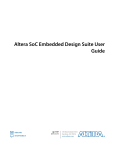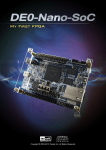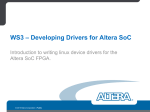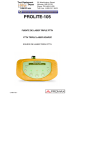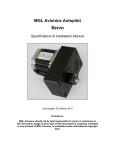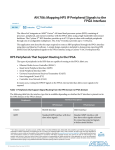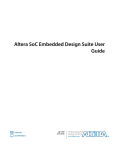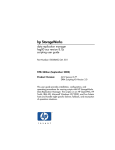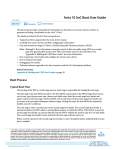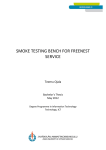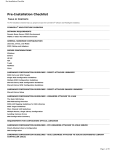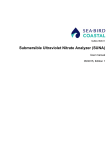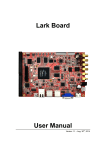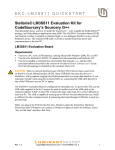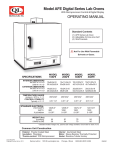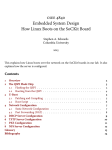Download Altera - RocketBoards.org
Transcript
Altera SoC Linux Intro Workshop Altera SW SoC Workshop Series SW Workshop #1 – Altera SoC SW Development Overview SW Workshop #2 – Introduction to Linux on Altera SoC SW Workshop #3 – Developing Drivers for Altera SoC Linux 2 Agenda Essential Information Resources SoC Device Overview SoC Physical Address Map SoCFPGA Development Flow & Tools Altera SoC Linux Overview Components of the SoC FPGA Linux BSP SoC Linux Upstreaming & Driver Support Altera SoC Linux Boot Flow Das U-Boot Bootloader Linux Device Tree for SoC FPGA Take Home Lab 3 Welcome. Here’s What You Can Expect Today Experienced Linux Developers Find a familiar embedded Linux development flow Overview of upstreaming and driver support for mach_SoCFPGA architecture Guide to SoCFPGA resources New Linux Developers An exposure to the components of embedded Linux Essential Linux learning and documentation resources Hardware Developers HW handoff to Linux build flow Boot and FPGA configuration for Linux SW implications of HW architecture Everyone SoC FPGA architecture-specific information SoC FPGA recommendations and best practices Focused on SoC/Nios Linux Specific Topics 4 Essential Information Resources Where to learn more… …a non-exhaustive list 5 Linux Foundation Training Linux Developer classes are designed to help participants: Learn how to develop an embedded Linux product Become familiar with and learn to write device drivers Get practical experience with the Linux kernel Learn how to work with the Linux developer community Developer Courses • LFD331 – Developing Linux Device Drivers • LFD405 – Building Embedded Linux with the Yocto Project • LFD411 – Embedded Linux Development • LFD414 – Introduction to Embedded Android Development • LFD205 – How to Participate with the Linux Community • LFD211 – Introduction to Linux for Developers • LFD262 – Developing with Git • LFD312 – Developing Applications for Linux • LFD320 – Linux Kernel Internals & Debugging • LFD415 – Inside Android: An Intro to Android Internals • LFD432 – Optimizing Linux Device Drivers for Power Efficiency http://training.linuxfoundation.org/linux-courses/development-training 6 Linux Documentation Resources GIT Distributed revision control system to enable distributed collaboration On-line documentation & training: http://git-scm.com/doc https://training.github.com Denx U-Boot Manual Complete documentation from the folks who wrote Das U-Boot http://www.denx.de/wiki/U-Boot/Documentation Free-Electrons: Complete training materials posted free http://free-electrons.com/docs/ Device Tree for Dummies 7 http://events.linuxfoundation.org/sites/events/files/slides/petazzoni-device-treedummies.pdf The Two Best Sources for Linux Development Information Linux Kernel Documentation The most complete and most essential Linux kernel documentation Included with the Linux kernel source code <local GIT repo>/Documentation 8 The Two Best Sources for Linux Development Information An open source OS breeds open source information 9 RocketBoards.org – Altera SoC Linux Community Portal The source for SoC FPGA Linux info Golden System Reference Design (GSRD) Updates on latest releases Step-by-step getting started guides SoC FPGA Mailing List - RFI Active community participation in answering SoC FPGA and Linux questions Example Projects, Applications, and Designs From Altera and the SoC community Enables the SoC community to support Linux 10 RocketBoards.org Resources Information on your Development Kit Starting point for documentation Mail Lists & Forum for Community Support Link to GitHub Repos 11 RocketBoards.org Documentation 12 RocketBoards.org – Useful Links GSRD User Manual The best starting point for Linux development http://www.rocketboards.org/foswiki/Documentation/GSRD Device Tree Generator User Guide http://www.rocketboards.org/foswiki/Documentation/GSRD141DeviceTreeGenerator Programming FPGA from HPS http://www.rocketboards.org/foswiki/Documentation/GSRD131ProgrammingFPGA GSRD Releases 13 http://releases.rocketboards.org Several Ways to Learn! Instructor-led training Face to face with an Altera expert Training Engineer 20+ courses to choose from (8 hour classes) Virtual classes (taught via WebEX) Can ask questions to Altera expert Training Engineer Course content same as instructor-led classes (1/2 day sessions) Online training (free and always available) 200+ topics available (~30 minutes in length) Videos (free and always available) YouTube videos (~4 minutes each) 14 SoC Classes Available Instructor-led or virtual classes Designing with an ARM-based SoC Developing Software for an ARM-based SoC Online classes 15 Hardware Design Flow for an ARM-based SoC Software Design Flow for an ARM-based SoC SoC Hardware Overview: the Microprocessor Unit SoC Hardware Overview: Interconnect and Memory SoC Hardware Overview: System Management, Debug, and General Purpose Peripherals SoC Hardware Overview: Flash Controllers and Interface Protocols SoC Bare-metal Programming and Hardware Libraries Getting Started with Linux for Altera SoCs Essential SoC Software Tools Online Videos ARM DS-5 Altera Edition Toolchain https://youtu.be/HV6NHr6gLx0 DS-5 Altera Edition: Bare-metal Debug and Trace https://youtu.be/u_xKybPhcHI DS-5 Altera Edition: FPGA-adaptive Linux Kernel Debug and Trace https://youtu.be/lrR-SfVZd18 Debugging Linux applications on the Altera SoC with ARM DS-5 https://youtu.be/ZcGQEjkYWOc FPGA-adaptive debug on the Altera SoC using ARM DS-5 https://youtu.be/2NBcUv2TxbI Streamline Profiling on Altera SoC FPGA. Part 1 - Setup https://youtu.be/X-k9lmXQTio Streamline Profiling on Altera SoC FPGA. Part 2 - Running Streamline 16 https://youtu.be/Tzbd7qldKqY Essential SoC Hardware Documentation Resources Hard Processor System Technical Reference Manuals Available in Device Handbooks: https://www.altera.com/products/soc/portfolio/cyclone-v-soc/support.html https://www.altera.com/products/soc/portfolio/arria-v-soc/support.html https://www.altera.com/products/soc/portfolio/arria-10-soc/support.html Contain Functional Descriptions Peripheral Contain Control Register Address Map and Definitions These are also available online at the links above in HTML and PDF formats HPS SoC Boot Guide Cyclone V SoC & Arria V SoC: AN709 - HPS SoC Boot Guide Arria 10 SoC: included in HPS TRM in Arria 10 Device Handbook ARM Documentation Site Documentation available for all ARM IP Cortex-A9 & A53 MP Cores, FPU, NEON, GIC, ARM Peripherals, etc. Requires free registration Refer to HPS TRM for IP core names and revision information http://infocenter.arm.com/help/index.jsp 17 Essential SoC Software Documentation Resources Altera SoC Embedded Design Software (SoC EDS) Tools User Guide: https://www.altera.com/content/dam/altera-www/global/en_US/pdfs/literature/ug/ug_soc_eds.pdf Linux & Baremetal Software Development Tools Overview HPS Preloader User Guide HPS Flash Programmer User Guide SD Card Boot Utility Getting Started Guides: Preloader, Linux, Bare Metal, Debug, HW Library http://www.alterawiki.com/wiki/SoCEDSGettingStarted SoC HPS Release Notes SoC Abstraction Layer (SoCAL) API Reference <SoC EDS install dir>/ip/altera/hps/altera_hps/doc/socal/html/index.html Hardware Manager API Reference <SoC EDS install dir>/ip/altera/hps/altera_hps/doc/hwmgr/html/index.html GCC Documentation <SoC EDS install dir>/ds-5/documents/gcc/getting_started.html Bare Metal Compiler <SoC EDS installation directory>/host_tools/mentor/gnu/arm/baremetal/share/doc/sourceryg++-arm-altera-eabi 18 SoC Device Overview 19 Altera Investment in Embedded Technologies Altera established Austin Technology Center (ATC) in 2011 Altera’s primary embedded engineering center Austin provides access to one of the richest embedded processing talent bases in the world 20 Altera SoC Product Portfolio MID RANGE SoCs HIGH END SoCs (Lowest Power, Form Factor & Cost) (High Performance with Low Power, Form Factor & Cost) (Highest Performance & System Bandwidth) HIGH PERFORMANCE LOW END SoCs • • • • • LOW POWER • • • • • • • • 28nm TSMC 925 MHz Dual ARM CortexTM-A9 MPCoreTM 5G Transceivers 400 MHz DDR3 25 to 110 KLE Up to 224 Multipliers (18x19) • • • • 28nm TSMC 1.05 GHz Dual ARM CortexTM-A9 MPCoreTM 10G Transceivers 533 MHz DDR3 Up to 462 KLE Up to 2136 Multipliers (18x19) • • • • 20nm TSMC 1.5 GHz Dual ARM CortexTM-A9 MPCoreTM 17G Transceivers 1333 MHz DDR4 Up to 660 KLE Up to 3356 Multipliers (18x19) • 14nm Intel Tri-Gate 64-bit Quad ARM A53 MP CoreTM Optimized for Max Performance per Watt Over 4000 KLE DEVICE AVAILABILITY SoC devices available across entire product portfolio … 21 ARM Public Processor Offering Cortex-A57 Cortex-A53 CORTEX-A Stratix 10 Cortex-A17 Cortex-A15 Cortex-A12 Cortex-A9 Application Processor Cyclone V, Arria V, Arria 10 Cortex-A8 Cortex-A5 CORTEX-R Cortex-R7 Cortex-R5 Real-time control Cortex-R4 CORTEX-M Cortex-M4 Cortex-M3 Cortex-M1 Microcontroller Cortex-M0+ SECURCORE Cortex-M0 SC000 SC100 SC300 Secure 28nm SoC System Architecture Processor Dual-core ARM® Cortex™-A9 MPCore™ processor Up to 5,250 MIPS (1050 MHz per core maximum) NEON coprocessor with double-precision FPU 32-KB/32-KB L1 caches per core 512-KB shared L2 cache Multiport SDRAM controller DDR3, DDR3L, DDR2, LPDDR2 Integrated ECC support High-bandwidth on-chip interfaces > 125-Gbps HPS-to-FPGA interface > 125-Gbps FPGA-to-SDRAM interface Cost- and power-optimized FPGA fabric Lowest power transceivers Up to 1,600 GMACS, 300 GFLOPS Up to 25Mb on-chip RAM More hard intellectual property (IP): PCIe® and memory controllers 23 Arria 10 HPS Block Diagram ARM CORTEX™ – A9 MP SECURITY SD / SDIO/ MMC (1) 16550 UART (x2) I2C (X5) SPI (x2) EMAC with DMA (x3) USB OTG (x2) 8 Channel DMA 256 KB SCRATCH RAM DEDICATED GPIO (17) GP TIMERS (x7) ARM CoreSight ™ Multicore Debug/ Trace CORE 1 ARM Cortex – A9 MP Core NEON SIMD FPU 32 KB I$/D$ w/ Parity POWER MANAGEMENT QSPI FLASH CNTRL ARM Cortex – A9 MP Core NEON SIMD FPU 32 KB I$/D$ w/ Parity SDRAM (3) INTERCONNECT FPGA to HPS SDRAM BRIDGE 2 32/64/128 Port 1 32/64 bit Port 250 MHz CONFIGURATION L3 INTERCONNECT (NETWORK ON CHIP) LW HPS TO CORE BRIDGE AXI 32 FPGA LOGIC HPS to FPGA BRIDGE AXI 32/64/128 300 MHz FPGA to HPS BRIDGE AXI 32/64/128 300 MHz PCIe Gen 3 X 8 Controller Hard IP PCS & FEC (Interlaaken PCS, 10G KR-FEC) PHY 24 ON CHIP ROM Notes: (1) Integrated direct memory access (DMA) (2) Integrated ECC (3) DDR3/4 & LP DDR3 SDRAM Support fo HPS Memory FPGA CONFIG MANAGER USER IO Snoop Control Unit Watch Dog (Network SECURITY On Chip) 64-bit AXI Coherent Bus Interface L3 INTERCONNECT MANAGER Timer (x4) HARD MEMORY CONTROLLER (1) (2) CORE 2 512 KB L2 CACHE (SHARED) w/ ECC Accelerator Coherency Port NAND Flash High-Level Block Diagram FPGA HPS to FPGA FPGA to HPS EMAC (2) Configuration Control FPGA Config ARM Cortex-A9MPCore CPU0 ARM Cortex-A9 NEON/FPU 32 KB I$ 32 KB D$ ACP USB OTG (2) FPGA to SDRAM CPU1 ARM Cortex-A9 NEON/FPU 32 KB I$ 32 KB D$ SCU Flash Control DMA TMC (Trace) Interconnect L2 Cache (512 KB) Boot ROM On-chip RAM 64 KB Debug Port Low Speed Peripherals Timers, GPIO, UART, SPI, I2C, CAN 25 HPS ... Multi-port DDR SDRAM Controller A Comparison: Cyclone V SoC, Arria V SoC, Arria 10 SoC Metric Cyclone V SoC Arria V SoC Arria 10 SoC 28nm 28nm 20nm Processor Performance 925 MHz 1.05 GHz 1.5 GHz Total Power Dissipation 100% 100% 60% (40% Lower) Gen 2 x4 Gen 2 x8 Gen 3 x8 DDR2, DDR3, DDR3L, LPDDR2 DDR2, DDR3, DDR3L, LPDDR2 DDR4/3, LPDDR2/3, QDRIV, RLDRAM III, Hybrid Memory Cube 40-bit (32-bit + ECC) 40-bit (32-bit + ECC) 72-bit (64-bit + ECC) EMAC x 2 EMAC x 2 EMAC x 3 8-bit 8-bit 8-bit and 16-bit SD/SDIO/MMC SD/SDIO/MMC SD/SDIO/MMC 4.5 with eMMC FPGA Logic Density Range (LEs) 25 - 110K 370 - 450K 160 - 660K FPGA Core Performance 260 MHz 307 MHz 500 MHz Technology Max PCI Express Hard IP Memory Devices Supported Max. HPS DDR DataWidth EMAC Cores NAND Device Supported SD/MMC devices supported 26 SoC Physical Address Map Essential HW information for SW Developers 27 Cyclone V & Arria V SoC HPS Physical Memory Map L3 (Default) HPS Slaves 0xFF20_0000 MPU H2F_LW Slaves H2F FPGA Slaves FPGA to SDRAM 4 GB HPS Slaves H2F FPGA Slaves 0xC000_0000 3 GB ACP Window SDRAM 0x8000_0000 SDRAM Region 2 GB SDRAM Region 1 GB 0x0000_0000 RAM/SDRAM Default remap to 0x0 28 Boot Region RAM/ROM/SDRAM Remaps as RAM & ROM or SDRAM 0 GB Arria 10 SoC HPS Physical Memory Map L3 (Default) HPS Slaves 0xFF20_0000 H2F FPGA Slaves MPU H2F_LW Slaves FPGA to SDRAM 4 GB HPS Slaves H2F FPGA Slaves 0xC000_0000 3 GB SDRAM 0x8000_0000 SDRAM Region 2 GB SDRAM Region 1 GB 0x0000_0000 RAM/SDRAM Boot Region RAM/ROM/SDRAM Remaps as RAM & ROM or SDRAM 29 0 GB Arria 10 SoC HPS Physical Memory Map FPGA to HPS Bridge HPS Slaves 0xFF20_0000 H2F FPGA Slaves MPU H2F_LW Slaves FPGA to SDRAM 4 GB HPS Slaves H2F FPGA Slaves 0xC000_0000 3 GB SDRAM 0x8000_0000 ACP Window SDRAM or Region SDRAM direct 2 GB SDRAM Region 1 GB 0x0000_0000 Boot Region ACP/SDRAM selected by AxCACHE 30 Boot Region RAM/ROM/SDRAM 0 GB Physical Address Mapping 31 Physical Address Mapping – FPGA to SDRAM FPGA Masters have access to full 4GB of SDRAM address space 4 GB Subject to MPFE MPU restrictions No coherency No virtual addressing 3 GB SDRAM 2 GB 1 GB 0 GB 32 Physical Address Mapping – MPU MPU has access to the lower 3 GBytes of SDRAM Kernel manages and can allocate memory in this 3GByte space HPS Slaves H2F FPGA Slaves 3 GB Allocate for both user and kernel space Allocatable on 4K Byte Boundaries (page size) 2 GB SDRAM Region 1 GB 0 GB 33 Physical Address Mapping – MPU to FPGA MPU can access 960 MBytes of FPGA address space via HPS to FPGA Bridge MPU can access 2 MB of FPGA address space via HPS to FPGA Lightweight bridge Not allocatable in user space Space FPGA peripherals on Linux page size (4KB) boundaries Access methods discussed in Developing Linux Drivers for Custom Peripherals Workshop 34 HPS Slaves H2F FPGA Slaves SDRAM Region Physical Address Mapping – FPGA to HPS FPGA to HPS (F2H) masters see 4 GByte address space F2H bandwidth to SDRAM limited vs. FPGA to SDRAM bridge HPS Slaves H2F FPGA Slaves ACP Window SDRAM Region 35 Cyclone V SoC Memory Map Example - SDRAM 1 GByte FPGA SDRAM 1 GByte HPS SDRAM 36 Cyclone V SoC GSRD Memory Map Example - SDRAM FPGA F2H Master - 960MB available for all FPGA slaves - MPU cannot directly access full 1GByte of FPGA SDRAM - Not allocatable by kernel HPS Slaves MPU H2F_LW Slaves H2F FPGA Slaves FPGA to SDRAM 4 GB HPS Slaves H2F FPGA Slaves 3 GB Undecoded ACP Window Undecoded 2 GB Undecoded 1 GB 1 GByte HPS SDRAM SDRAM Region SDRAM Region SDRAM 0 GB Default remap to 0x0 37 Cyclone V SoC Memory Map Example - PIO LED PIO 38 Cyclone V SoC Memory Map Example - PIO LED PIO in FPGA 39 Cyclone V SoC GSRD Memory Map Example Look at led_pio at Address 0x0001_0040 40 Cyclone V SoC GSRD Memory Map Example It is connected to 3 Masters. 41 Cyclone V SoC GSRD Memory Map Example Each master sees the slave at a different address These address are offsets from the HPS bridge address ARM sees LED bridge ARM sees LED H2F bridge bridge + H2F bridge LED_PIO base + = LED_PIO base = through the H2F through the LW 0xC000_0000 0xff20_0000 0x0001_0040 0xC001_0040 0x0001_0040 0xff21_0040 JTAG Master sees LED H2F LED_PIO base 0x0001_0040 = 0x0001_0040 42 SoCFPGA Development Flow & Tools Why Does This Matter for Linux Development? Altera SoCs offer unique advantages User specified peripheral set Tightly-coupled MPU & FPGA fabric One of a kind HW/SW debug capabilities Altera SoCs have unique requirements Understanding of paths to exchange data between MPU and FPGA Building custom BSP for user specified peripheral set Correct handling and configuration of HPS/FPGA bridges Altera SoCs have tools to enable the power of a integrated MPU and FPGA 44 Altera SoC Embedded Design Suite FPGA Design Flow Software Design Flow Hardware Development • Quartus II design software • Qsys system integration tool • Standard RTL flow • Altera and partner IP Design • ModelSim, VCS, NCSim, etc. • AMBA-AXI and Avalon bus functional models (BFMs) Simulate • SignalTap™ II logic analyzer • System Console • Quartus II Programmer • In-system Update 45 Software Development HW/SW Handoff Design Simulate • ARM Development Studio 5 • GNU toolchain • OS/BSP: Linux, VxWorks • Hardware Libraries • Design Examples • VirtualSoftware Platform Development Debug Release FPGA-Adaptive Debugging Debug Release • GNU, Lauterbach, DS5 • Flash Programmer So… what exactly is Qsys? GUI based system integration tool for HW system design using IP blocks. Simplifies complex system development Raises the level of design abstraction Provides a standard platform: IP integration Custom IP authoring IP verification Enables design re-use Scales easily to meet the needs of end product Reduces time to market Qsys System Integration Platform 47 Hard Processor System Configuration 48 Linux HW/SW Handoff – Cyclone V SoC and Arria V SoC Hardware Qsys system info, SDRAM calibration files, ID / timestamp, HPS IOCSR data system.iswinfo Software 49 system.sopcinfo board info Preloader Generator Device Tree Generator .c & .h source files (u-boot spl) Linux Device Tree DTC Bootloader DT Source Bootloader DT Blob Regenerate only when user options (boot source, etc.) change Provided by Altera Open Source Makefile Output File U-Boot Src Code Make Input File Intermediate File Different DTBs U-Boot Binary mkpimage Board Info Linux DT Blob Regenerate when HW project is recompiled Handoff Folder Bootloader Generator: bsp-editor Hardware Project Quartus II Board Info Device Tree Generator: sopc2dts Linux HW/SW Handoff – Arria 10 SoC U-Boot Image Altera SoC Embedded Design Suite Comprehensive Suite SW Dev Tools Hardware-toSoftware Handoff Hardware / software handoff tools Preloader & Device Tree Generators Bare-metal application development SoC Hardware Libraries Bare-metal compiler tools Firmware Development Linux Application Development FPGA-adaptive debugging ARM DS-5 Altera Edition Toolkit FPGAAdaptive Debugging Linux application development Yocto Linux build environment Pre-built binaries for Linux / U-Boot Work in conjunction with the Community Portal Design examples 51 Free Web Edition Subscription Edition Free 30-day Eval Industry First: FPGA-Adaptive Debugging Altera USB-Blaster™II Connection ARM® Development Studio 5 (DS-5™) Altera® Edition Toolkit Removes debugging barrier between CPUs and FPGA Exclusive OEM agreement between Altera and ARM Result of innovation in silicon, software, and business model Supports FPGA-Adaptive Linux kernel, driver & application debug 52 Cross-Domain Debug 1 Trigger from software world to FPGA world SOFTWARE TRIGGER HARDWARE TRIGGER! 53 Cross-Domain Debug 2 Trigger from FPGA world to software world HARDWARE TRIGGER EXECUTION STOP OR HW TRACE TRIGGER 54 EXECUTION STOP OR SW TRACE TRIGGER Correlate HW and SW Events Debug event trigger point set from either: ARM® DS-5™ Toolkit SignalTap™ II Logic Analyzer or DS-5 debugger Timestamp Correlated Captured trace can then be analyzed using SignalTap II Logic Analyzer timestamp-correlated events 55 SoC EDS Editions Summary Web Edition Subscription Edition 30-Day Evaluation Preloader Image Generator x x x Flash Image Creator x x x Device Tree Generator (Linux) x x x Eclipse IDE x x x Debugging over Ethernet (Linux) x x x Debugging over USB-Blaster II JTAG x x Automatic FPGA Register Views x x Hardware Cross-triggering x x CPU/FPGA Event Correlation x x x x x CodeBench Lite EABI (Bare-metal) X x x Hardware Libraries Bare-metal programming Support x x x SoC Programming Examples Golden System Reference Design x x x Component Hardware/Software Handoff Tools ARM DS-5 Altera Edition Key Feature Compiler Tool Chains Linaro Tool Chain (Linux) Everything needed for Linux development is free & open source 56 Altera SoC Linux Overview Linux for Altera SoCs High Quality Linux Support Modern release strategy Multiple Kernel Versions Community Enablement 58 Linux Strategy Kernel Same kernel source tree for all SoC’s and NIOS II Same kernel binary for all 32bit SoCFPGA Same kernel binary for all 64bit SoCFPGA Device tree support (SoCs and NIOS II) Upstream and maintain to kernel.org U-Boot 2013.01.01 supported for Cyclone V & Arria V SoC 2014.10 supported for Arria 10 SoC 2015.xx support in progress Same U-Boot source tree for all SoC’s and NIOS II Toolchain Standard, un-patched Linaro Toolchain: gcc-linaro-arm-linux-gnueabihf-4.9-2014.09 59 Linux Strategy - Build Systems Offer support for Angstrom for SoC Embedded Linux distribution, Yocto Project configuration, package manager (OPKG) Uses meta-altera Yocto layer Currently 2014.12 Linaro GCC 4.9 for 32 bit SoCs Yocto Project Support for SoC SoCFPGA layer (meta-altera) upstreamed to Angstrom Yocto Project v1.7 ready Buildroot for both SoC and Nios II Roll your own from relevant source 60 Build System Resources Angstrom flow for SoC http://rocketboards.org/foswiki/view/Documentation/AngstromOnSoCFPGA_1 Yocto flow for SoC http://www.rocketboards.org/foswiki/Documentation/YoctoDoraBuildWithMetaAltera Source Poky from the Yocto Project website git://git.yoctoproject.org/poky.git Buildroot flow for Nios II http://rocketboards.org/foswiki/view/Documentation/NiosIILinuxUserManual Buildroot flow for SoC http://www.rocketboards.org/foswiki/Documentation/BuildrootForSoCFPGA 61 Angstrom/Yocto Information Resources Yocto Project https://www.yoctoproject.org/documentation Angstrom Distribution http://www.angstrom-distribution.org/ Open Embedded http://www.openembedded.org/wiki/Main_Page Building Linux w/ Yocto Linux Foundation class LFD405 – Building Embedded Linux with the Yocto Project 62 Altera SOC Linux Provides Customers Kernel Choices 2015 2014 Feb Mar Apr May Jun Jul Aug Sep Oct Nov Dec Jan Feb Mar Apr May Jun 2016 Jul Aug Sep Oct Nov Dec Jan Feb Altera SoC Linux supports the latest stable kernel 3 mos 3 mos 3 mos 3 mos 3 mos 3 mos NEW – Altera SoC Linux also supports LTSI kernel LTSi v3.10 24 months LTSI kernel available with or without Preempt Real Time Patches 63 Mar Status of the Linux kernel for SoC FPGA Current versions Latest stable: refer to linux-socfpga git repo tags: rel_socfpga-x.x… We keep up with Linus Torvalds releases LTSI v3.10 Maintained for its lifetime Next LTSI version for SoCFPGA will be 4.1 – available end of 2015 Real-Time: 3.10-ltsi-rt LTSI kernel with PREEMP_RT patches All branches are kept in sync Bug fixes New features No changes of API in the LTSI branches 64 Wind River Linux Wind River Linux version 7 Linux SMP Kernel version 3.14 (LTSI) Real Time patches & Carrier Grade Linux available Yocto project user space Bitbake build system WR Workbench Tools Available now from Wind River Technical Support: – www.windriver.com – [email protected] 65 Monta Vista Linux Monta Vista Linux CGE7 Carrier Grade Edition Linux SMP Kernel version 3.10 (LTSI) Yocto project user space Available from Monta Vista Technical Support: www.mvista.com 66 Latest Stable Kernel vs. LTSI Kernel Latest Stable Kernel Access to latest kernel features New features and drivers often released only to the latest kernel version Significant investment in kernel maintenance: Back porting features, bug fixes, device support, & new drivers or… Constant upgrades to latest stable kernel 67 LTSI Kernel LTSI kernel versions supported for 2 years Critical bug fixes, priority features, & new device or driver support back-ported to LTSI kernel by the community Reduces investment in kernel maintenance Features, bug fixes, device support, & new drivers ported by the community LTSI – Economic value 68 Linux Code Quality Altera’s internal development process is similar to the community’s Code/Peer reviews Code style checked Copyright, licenses, etc checked All checks enforced Daily Builds Automated builds run daily Complete system: boot loader, kernel, Angstrom SD card image produced Daily Tests Linaro’s LAVA is used All kernel branches tested 69 Linux Code Tests Objectives Daily test of the supported Linux kernel branches Provide feedback to developers Infrastructure Linaro’s LAVA is used Linaro Automated Validation Architecture Runs our unit tests and log results Tests start automatically after each build is complete 70 Altera SoC Linux Support Model Rocketboards.org SoC & Nios II Linux documentation SoC & Nios II SoC Linux reference & example designs Rocketboards.org RFI & Linux Community Kernel/RFS/u-boot questions SoC/Nios II subsystem and driver questions Altera.com and Rocketboards.org SoCEDS & Quartus/QSys documentation and questions SoC Preloader questions SoC HPS implementation specific questions Use myAltera for service requests Support from Altera is focused on SoCFPGA and NiosII Linux Board Support Package Altera enables Linux community development on SoCFPGA & Nios II 71 Break 72 Components of the SoC FPGA Linux BSP 73 Building a Custom Embedded Linux Distribution How do I get from here…. …to here? Altera provides a Linux BSP… …not a Linux distribution. The BSP enables the creation of a custom distribution 74 SoC Linux Board Support Package U-Boot Device Tree SoC Machine Specific Layer – mach-socfpga Drivers for SoC and board components Kernel Root File System SoC Linux BSP release provides all of the components in fully nonproprietary source code form 75 User Space (debug, compiler, shell, etc) Root File System Kernel Drivers Machine Specific Layer Device Tree U-Boot SoC Board BSP SoC Linux Board Support Package User Space (debug, compiler, shell, etc) Example configuration to enable evaluation and initial development Root File System Kernel configuration to enable evaluation and initial development Kernel Up-streamed and community supported drivers Up-streamed mach-socfpga architecture Board-specific layer which enables common kernel binary Open-source, community supported boot loader Development kit or custom board Drivers Machine Specific Layer Device Tree U-Boot SoC Board 76 BSP Cyclone V SoC Development Kit Everything you need to begin Linux development SoC Development Kit Golden System Reference Design A Linux distribution for the dev. kit Features: 1 user license for ARM DS-5 Altera Edition Toolkit Ethernet, USB, CAN, UART DDR3 (HPS and FPGA), SDCard, QSPI PCIe (rootport & endpoint) Expansion header Much more . . . www.altera.com/products/devkits/altera/kit-cyclone-v-soc.html 77 Linux GSRD for Development Kits Boot Linux from an SD card Updated images on: http://releases.rocketboards.org/ • Choose a release date folder, the “gsrd” folder, then the “bin” folder. Ex: http://releases.rocketboards.org/release/2014.12/gsrd/bin 3.10 LTSI kernel Angstrom Linux distribution for SoC Package manager to load packages from Angstrom’s on-line package feed Add whatever tools are needed for evaluation: gstreamer, usb-utils, etc… GSRD contents Complete HW reference design w/ FPGA programming file Bootable SD card image & component binaries Tagged for rebuilding in angstrom-socfpga git repository ACDSX.X_REL_GSRD_PR A complete SD card ships with the board Take it out and stick it in a drawer Based on out-of date 3.9 kernel 78 Multiple Dev. Kit Options w/ Linux BSP 79 Kit Vendor Family Arria 10 SoC Dev. Kit Altera Arria 10 SoC Arria V SoC Dev. Kit Altera Arria V SoC Cyclone V SoC Dev. Kit Altera Cyclone V SoC Atlas Board Altera Cyclone V SoC SoCKit Arrow Cyclone V SoC Helio SoC Eval. Platform Macnica Cyclone V SoC SoCrates EBV Elektronik Cyclone V SoC SoC Linux Up-streaming & Driver Support Maintaining and Up-streaming Altera awarded maintainership for the ‘SoC FPGA’ architecture Kernel (arch/arm/mach-socfpga) U-Boot (altera/socfpga_cyclone5) Being a maintainer means We upstream the SoC related code We control the changes against the SoC code requested by the community See kernel.org and git.denx.de Open Source Community Kernel.org, U-Boot, other upstream Maintainer Public Repo/git Other community contributions Device Tree Generator: sopc2dts Yocto meta-altera layer 81 Customers & Partners Contributors SoCFPGA Linux Code Repositories on GitHub Public git repos for SoCFPGA https://github.com/altera-opensource Migrated from RocketBoards Rocketboards.org git repos are no longer updated 82 SoCFPGA Linux Code Repositories on GitHub Repository Description linux-socfpga.git/ SoCFPGA Linux development repository • Mirrors kernel.org linux repo releases • Downstream branches for socfpga specific patches and updates meta-altera.git/ angstrom-socfpga.git/ uboot-socfpga.git/ Repository for Yocto recipes for SoCFPGA • Starting point for custom Yocto recipes Setup scripts for SoCFPGA Angstrom distribution SoCFPGA u-boot development repository sopc2dts.git/ Device Tree Generator (sopc2dts) repository linux-refdesigns.git/ SW source code for Linux reference designs * Sourced from: github.com/altera-opensource/ 83 Kernel Release Cycle – Merge & Bug Fix 2 Weeks Long Term Stable Tree ~12 Weeks 3.17.1 3.17.8 kernel.org linux-stable repo 3.18.1 Mainline Kernel Development Tree rc1 v3.17 New Features Stabilization No New Features Bug Fixes Only various development repositories 84 rc1 v3.18 rcn kernel.org mainline repository Merge Window Community Accepted Code rcn 3.18.2 Merge Window New Features Stabilization No New Features Bug Fixes Only Kernel Release Cycle – Merge & Bug Fix 2 Weeks Long Term Stable Tree ~12 Weeks 3.17.1 3.17.8 kernel.org linux-stable repo 3.18.1 Mainline Kernel Development Tree rc1 v3.17 rc1 v3.18 New Features Stabilization No New Features Bug Fixes Only Merge Window New Features github.com/altera-opensource/linux-socfpga development repository Altera moves with the community to the latest stable kernel 85 rcn kernel.org mainline repository Merge Window Altera up streams with the community rcn 3.18.2 Stabilization No New Features Bug Fixes Only Altera BSP Kernel Development 2 Weeks Long Term Stable Tree ~12 Weeks 3.17.1 3.17.8 kernel.org linux-stable repo 3.18.1 Mainline Kernel Development Tree v3.17 Altera BSP Kernel Dev Major Release & Frequent Updates branch: socfpgav3.17 v3.18 New Features and all Bug Fixes & updates tag: rel_socfpga3.17_14.11.01 New Features and all Bug Fixes & updates tag: rel_socfpga3.17_14.11.01 branch: socfpgav3.18 github.com/altera-opensource/linux-socfpga repository 86 3.18.2 tag: rel_socfpga3.18_15.04.01 Altera LTSI Kernel Development Long Term Stable Tree LTS Industry Tree 3.10.31 kernel.org linux-stable repo 3.10.31 kernel.org ltsi-kernel repository LTSI patches Altera BSP Kernel Dev Major Release & Frequent Updates New Features & Bug Fixes branch: socfpga-v3.10-ltsi tag: rel_socfpga-3.10ltsi_14.02.03 tag: rel_socfpga-3.10ltsi_YY.MM.WW Latest tested release github.com/altera-opensource/linux-socfpga repository 87 Altera LTSI Kernel Development Long Term Stable Tree LTS Industry Tree 3.10.31 kernel.org linux-stable repo 3.10.31 kernel.org ltsi-kernel repository LTSI patches Altera BSP Kernel Dev Major Release & Frequent Updates New Features & Bug Fixes branch: socfpga-v3.10-ltsi tag: ACDS14.0.1_REL_ GSRD_PR tag: ACDS14.1_REL_ GSRD_PR Kernel tags for GSRD releases on Rocketboards github.com/altera-opensource/linux-socfpga repository 88 SoC Hard IP Driver Support Altera SoC HPS built mainly with off the shelf Hard IP components ARM Synopsys DesignWare Cadence Wide-spread usage and community support result in high-quality drivers Altera is actively contributing features, updates, and fixes to the community 89 Linux Driver Support for HPS Peripherals Driver 90 Kernel Source Tree Location Maintainer SPI drivers/spi/spidev.c drivers/spi/spi-dw.c drivers/spi/spi-dw-mmio.c Community CAN drivers/net/can/c_can/c_can_platform.c Community Ethernet drivers/net/ethernet/stmicro/stmmac/stmm ac_platform.c Community NAND mtd/nand/denali_dt.c Community I2C drivers/i2c/busses/i2c-designware-platdrv.c Community USB drivers/usb/dwc2/ Community USB PHY usb/phy/phy-generic.c Community SDMMC drivers/mmc/host/dw_mmc-pltfm.c Community Timer drivers/clocksource/dw_apb_timer_of.c Community Linux Driver Support for HPS Peripherals Driver 91 Kernel Source Tree Location Maintainer Watchdog drivers/watchdog/dw_wdt.c Community PL330 DMA dma/pl330.c Community GIC drivers/irqchip/irq-gic.c Community GPIO drivers/gpio/gpio-dwapb.c Community Timer drivers/clocksource/dw_apb_timer_of.c Community UART drivers/tty/serial/8250/8250_dw.c Community QSPI spi/spi-cadence-qspi.c Altera Clock Manager drivers/clk/socfpga/clk.c Altera FPGA Manager drivers/fpga/fpga-mgrs/altera.c Altera FPGA Bridges drivers/misc/fpga-bridge/ Altera EDAC (ECC) drivers/edac/altera_* Altera Linux Driver Support for soft Peripherals Driver Kernel Source Tree Location TSE Ethernet drivers/net/ethernet/altera Altera PCIe Root Port www.rocketboards.org www.rocketboards.org – w/o MSI Altera Frame Buffer video/altvipfb.c Community Avalon SPI spi/spi-altera.c Community Avalon UART tty/serial/altera_uart.c Community JTAG UART tty/serial/altera_jtaguart.c Community QSYS Sys ID misc/altera_sysid.c Altera Mailbox drivers/mailbox/mailbox-altera.c Altera Altera 16550 UART drivers/tty/serial/8250/8250_core.c Avalon PIO 92 Maintainer drivers/gpio/gpio-altera.c Community Altera Altera SoC Linux Boot Flow 93 Configuration Sources SOC Device Boot Source 94 FPGA HPS QSPI /SPI PCIe CPU QSPI /SPI Boot code (RAM/ROM) Passive Serial Passive Parallel MMC /SD NAND Flash Config Controller User Specified I/F AXI Boot ROM On-chip RAM Boot Sources Configuration Sources Altera SoC FPGA Configuration Options SoCFPGA Linux Boot Flow – Cyclone V & Arria V SoC • Starts Running code at reset exception address • Normal operation, BootROM is mapped to reset address Reset Boot ROM PreLoader • • • • • Hardcoded by Altera into device Read Boot source from BSEL pins Setup minimal configuration to read flash Load Preloader from Flash or execute from FPGA Jumps to Preloader • • • • • • U-Boot SPL Setup HPS IOs and pinmuxing Setup PLLs and clocking Initialize SDRAM Load subsequent stage from Flash into SDRAM Jump to subsequent stage (typically U-Boot) U-boot • Load Linux Linux Preloader Overview – Cyclone V & Arria V SoC Loaded by Boot ROM From flash and executed from on-chip RAM or run directly from FPGA Uses U-boot Secondary Program Loader (SPL) Open source, GPL Licensed Loads U-boot into RAM and jumps to U-boot Always regenerate and recompile Preloader when QSys system or HPS configuration changes Quartus/QSys version changes Not regenerating and recompiling the Preloader is the single most common source of SoC SW problems! Covered in detail in SoCEDS User Guide and Designing Software for ARM-Base SoC training class 96 SoCFPGA Linux Boot Flow – Arria 10 • Starts Running code at reset exception address • Normal operation, BootROM is mapped to reset address Reset Boot ROM U-boot Linux 97 • Hardcoded by Altera into device • Setup minimal configuration to read flash • Load Preloader from Flash in On-Chip memory (skipped if booting from FPGA) • Jumps to Preloader • • • • Setup IOCSRs and pinmuxing Setup PLLs and clocking Initialize SDRAM Load Linux Booting from SD/eMMC – GSRD Flow - Simplified Reset Boot ROM • Reads MBR from SD/eMMC • Locates custom Altera raw partition 1 type: 0xA2 • Checksums & loads Preloader image 0 from partition start address • On fail, loads next preloader image • Checksums & loads U-Boot from raw A2 partition 1 PreLoader U-boot • Loads kernel from FAT32 partition 2 • Boot script: • Configures FPGA from image on FAT32 partition 2 • Enables HPS/FPGA Bridges • Loads dtb & boots kernel Linux • Boots and mounts root file system from EXT partition 3 Provides ONE example of an SD/eMMC Linux boot flow GSRD SD Card Image for Cyclone V & Arria V Location File Name Desciption socfpga.dtb Device Tree Blob soc_system.rbf FPGA configuration file u-boot.scr U-Boot script: configures FPGA and loads kernel zImage Compressed Linux kernel image file Partition 2 (EXT3) Various Linux root file system Partition 3 (A2 raw) n/a Preloader image(s) n/a U-Boot image Partition 1 (FAT32) 99 GSRD SD Card Image for Arria 10 Location File Name Desciption socfpga.dtb Device Tree Blob soc_system.rbf FPGA configuration file u-boot.scr U-Boot script: configures FPGA and loads kernel zImage Compressed Linux kernel image file Partition 2 (EXT3) Various Linux root file system Partition 3 (A2 raw) n/a U-Boot image Partition 1 (FAT32) 100 Creating SD Card Images Create using Altera provided script See “tools” folder under GSRD release folders http://releases.rocketboards.org/ Builds complete SD card image which can be directly copied Use pre-built images In “bin” folder under GSRD release folders http://releases.rocketboards.org/ <SoCEDS install directory>/examples/software Can be directly copied to SD card Described in “Creating and Updating SD Card” section of GSRD User Manual http://www.rocketboards.org/foswiki/Documentation/GSRD 101 FPGA Configuration – Cyclone V & Arria V SoC Reset • When FPGA is configured first, the HPS is held in reset until the FPGA releases the HPS reset Boot ROM PreLoader Boot Loader Linux Application 102 • Preloader can configure the FPGA • Currently requires boot from QSPI • U-boot can configure the FPGA - recommended for Linux • U-boot supports file systems for FPGA configuration data • All peripherals available at OS boot • Linux can configure the FPGA, but tricky • Not all peripherals are available at boot • 28nm F2S Bridge Errata can lock the device FPGA Configuration – Arria 10 SoC Reset • When FPGA is configured first, the HPS is held in reset until the FPGA releases the HPS reset Boot ROM U-Boot Linux Application 103 • U-boot can configure the FPGA • U-boot supports file systems for FPGA configuration data • All peripherals available at OS boot • Partial reconfiguration from Linux: Quartus 16.0 Das U-Boot Bootloader 104 What is u-boot? Common embedded bootloader Command line interface w/ decent help and lots of hardware support Capable board bring up tool Driver support for a wide variety of essential peripherals Loads the Device Tree and modifies Device Tree configuration at run-time Loads the kernel and passes boot arguments From local file system, over network, or over a serial link Open-source & GPL licensed http://www.denx.de/wiki/U-Boot 105 U-Boot for SoCFPGA Sourced from GitHub Altera Opensource or SoCEDS https://github.com/altera-opensource/u-boot-socfpga.git <SoC EDS install dir>/examples/hardware/<*_ghrd>/…/uboot-socfpga Supported u-boot versions: Cyclone V SoC & Arria V SoC: 2013.01.01 Preliminary support for 2015.xx up streamed to Denx GIT repo Arria 10 SoC: 2014.10 2014.10 & later up streamed to Denx Git repo u-boot-socfpga branch & tag convention similar to linuxsocfpga 106 U-Boot for SoCFPGA SoCFPGA-specific u-boot documentation <u-boot-socfpga repo>/doc/README.SOCFPGA u-boot controls SDRAM size passed to kernel u-boot SDRAM sizing algorithm overwrites device tree SDRAM memory node entry Device tree entry overrides boot arguments SoCFPGA u-boot environment variables Pass HPS/FPGA bridge status and configuration info from preloader Enable FPGA programming from preloader 107 SoCFPGA HPS Peripherals Supported in U-boot Peripheral support in u-boot-socfpga 2013.01.01 MPU Subsystem Cache/MMU FPGA Manager Clock Manager Flash Memory Reset Manager MMU Mgmt System Manager NAND SDRAM Ctrl SD/MMC QSPI Interrupt Ctrl Pin I/O Cnf Mgmt ECC Mgmt Serial Cache Mgmt UART Cache Mgmt Interrupt Ctrl 108 Ethernet MAC Timers GPIO Watchdog DMA General Purpose Useful U-boot Commands and Variables Write memory location mw <address> <size> <optional count> mw 0xC0000000 0x10 0x6 Read memory location md<optional .b .w .l> <address> <optional size> md.w 0xC0000000 0x2 Control u-boot auto-boot Boot without delay: setenv bootdelay 0 Disable auto-boot (stop at u-boot command line): setenv bootdelay -1 Save environment variables to flash saveenv 109 Linux Device Tree for SoC FPGA 110 What’s a Linux Device Tree? A tree-like data structure for describing hardware in embedded systems Enables device drivers to be linked to Linux kernel at runtime No Linux kernel recompile required Drivers loaded dynamically after loading Device Tree Driver-specific Device Tree bindings are documented in the kernel documentation Documentation/devicetree/bindings See Device Tree Generator User Guide See link in GSRD User Guide 111 SoC FPGA Device Tree Bindings Example Specify base address and size Specify driver Specify interrupts Specify clock sources Enable peripheral i2c@0xffc04000 { compatible = "snps,designware-i2c"; reg = <0xffc04000 0x100>; interrupt-parent = <0x3>; interrupts = <0x0 0x9e 0x4>; clocks = <0x1e>; status = "okay"; speed-mode = <0x0>; i2c-sda-falling-time-ns = <0x1388>; i2c-scl-falling-time-ns = <0x1388>; atmel,24c32@0x51 { compatible = "atmel,24c32"; reg = <0x51>; pagesize = <0x20>; }; Driver specific bindings Load and configure drivers for sub-nodes }; 112 Device Trees for a Configurable Peripheral Set Typically developers build Linux for fixed form chips How do you build Linux for an FPGA fabric that changes? You use the Device Tree Generator Device tree information can be added to custom Qsys peripherals and custom drivers Device Tree Source can be edited by hand 113 How to use Altera SoC Device Tree Generator .sopcinfo file describes HPS and FPGA system Board info file describes external devices on board Device Tree Generator creates a plain text representation of the device tree – called the Device Tree Source (DTS) Device Tree Generator: SoCEDS sopc2dts tool sopc2dts distributed as part or SoCEDS or on RBO GIT repo Compile the text into a binary representation called the Device Tree Blob (DTB) Optionally directly generate DTB from sopc2dts Device Tree Source to Device Tree Blob Board/User Info .sopcinfo Handoff file Device Tree Generator DTS Compiler Directly generate Device Tree Blob 114 Board Info File XML file required as an input to sop2dts Specifies information of which QSys isn’t aware SPI or I2C timing or external peripherals and their properties External flash (QSPI, SPI, or NAND) properties (organization, specs, etc) Board specific Ethernet & PHY information Allows the developer to disable peripherals which may be enabled in preloader or FPGA HW 115 Take Home Lab 116 Workshop 2 Lab Overview Goal: Familiarize you with SoC FPGA Linux components and where to obtain them Overview You will build the SoC-specific pieces of a Cyclone V or Arria V SoC Linux distribution and run it on your dev. kit This flow builds each component discretely without a build system. It does not use the optional Yocto or Angstrom based build systems. It configures the distribution in a way which works for this lab, which may differ from your actual system requirements 117 What You’ll Need A supported Dev. Kit Altera Atlas Board Altera Cyclone V SoC Board Altera Arria V SoC Board Arrow SoCKIT Macnica Helio Board microSD Card Linux machine native or VM 4GByte RAM minimum Serial Terminal Application 118 Obtaining Lab Files and Instructions Posted on RocketBoards Link will be emailed out after class 119 What You Will Accomplish Generate and build the preloader Generate and compile the device tree Obtain and build u-boot Obtain, configure, and build the kernel Program to an SD card Run a Simple Linux App Verifies the lab was completed Submit results & feedback 120 Thank You

























































































































